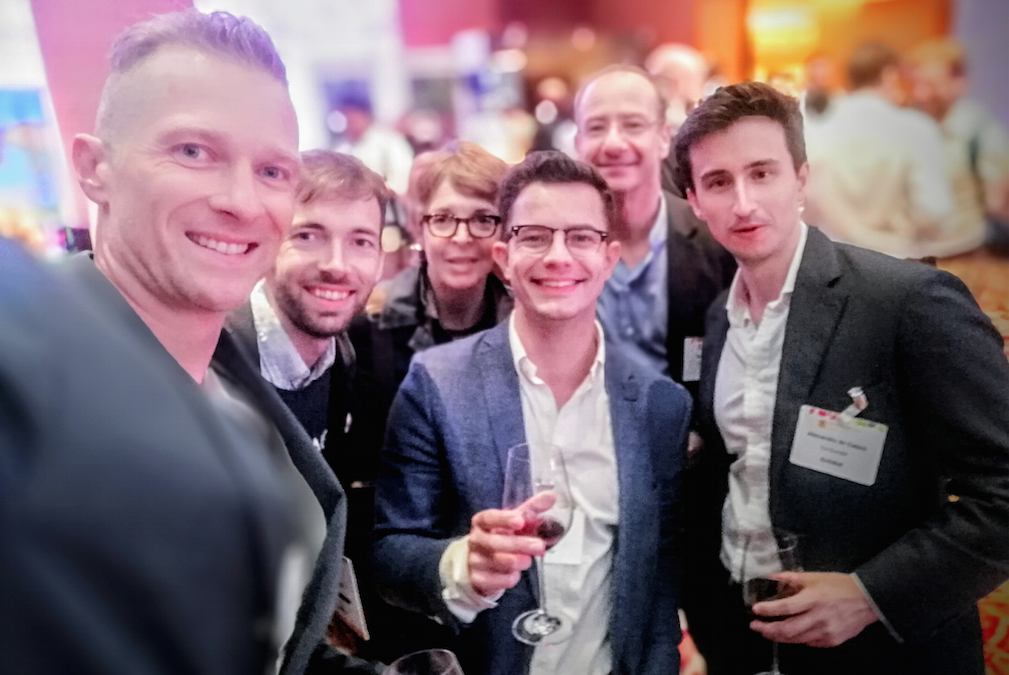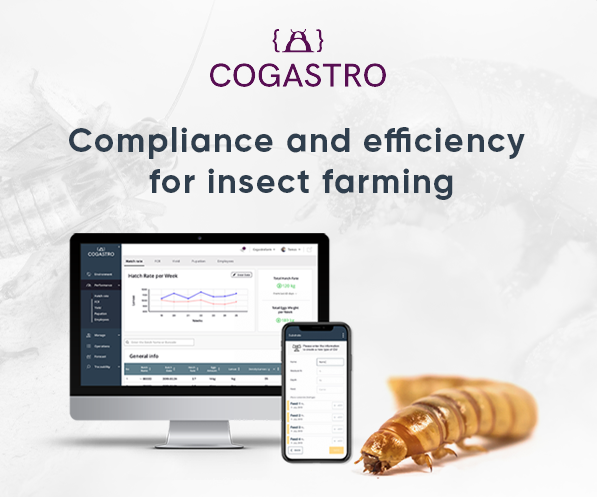(AFFIA members at the Agrifood Innovation week in Singapore, above, L-R: Entovegan, Protenga, EntoFood, Entobel, Nasekomo; momentarily out of the frame, Global Bugs)
The second annual rethink Agrifood Innovation Week just took place in Singapore, and by all accounts this year was 3x bigger than the first one, and is likely to become a mainstay on the global events calendar going forward.
AFFIA was one of the partners of the event, so our AFFIA Execom split the days we’d attend the sessions – I volunteered for the first day as that looked the most interesting to me, focused on AgTech, and it didn’t disappoint!
It was highly informative and educational, and yes, it confirmed my belief that initiatives like Entovegan Certified have merit and will rather quickly become an expected part of the food supply over the next decade. Those who avoid transparency and/or adoption of the latest technology in any aspect of farming and F&B will be left behind.
There were many other valuable networking events and discussions during the week on the periphery, but I want to provide some insights into what I took away from the main speaker and panel sessions.
In contrast with the Economist Events Feeding The Future conference I was at in August, where the idea of eating bugs was mentioned in passing but somewhat skeptically, insects as a food and feed solution were directly a huge part of this Agrifood Innovation event.
More than a dozen different insect companies were represented from all over the world, with some of the large players such as Agriprotein featured on panels as well. While the event wasn’t about the entomo-space, it’s encouraging to see not only the growth of insect-focused startups, but also the broad acceptance of entomophagy as a solution for feed and food, from VC’s and corporates alike.
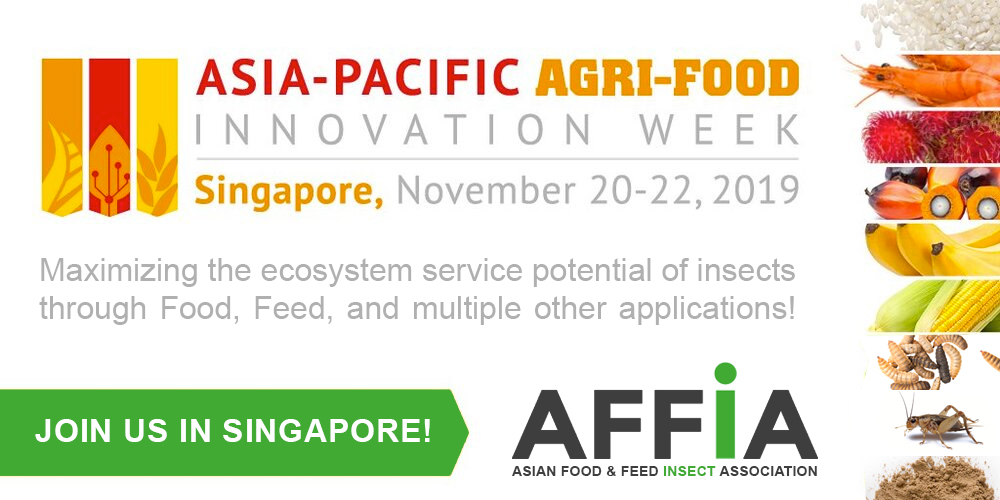
Around 1/3 of AFFIA’s members were in Singapore for the Agrifood Innovation week. Learn more about what the association can do for your insect business in Asia, at AFFIA.org
AGTECH – AND SINGAPORE – WILL FUNDAMENTALLY CHANGE FOOD PRODUCTION
Can you imagine Singapore becoming a net-exporter of beef, or dairy? Will smallhold farmers in the frontier, in countries such as Bangladesh or Cambodia, be running data-driven farms surpassing the USA within the next decade? Can corporates such as Pepsi lead the world in clean, traceable, sustainable food production?
These and many other questions were discussed at length throughout a variety of sessions focused on technology’s role in food security. What were once unfathomable concepts are today’s reality – this is not just talk of future hypotheticals, this is happening now, and it’s seriously exciting!
The first keynote of the day was Dr. Koh Poh Koon, the head of Singapore’s ministry of trade and industry, along with the ministry of national development. A friend of mine in Singapore saw his name in the agenda and was thoroughly impressed, but what’s even more impressive is his dedication to make Singapore a model of sustainability and food security for the future.
The geographically minuscule city-state has pledged more than $90 million for startups at its new agrifood innovation park, now slated to open in mid-2020 (previous reports had it scheduled for 2021 – leave it to Singapore to be early!). The country is also dedicated to 30% self-sufficiency by 2030, a monumental undertaking but one which seems plausible in light of what they’re developing.
The startup park will focus on urban agriculture, agtech, and alternative proteins including insect agriculture, and encompasses various governmental agencies supporting R&D with favorable regulations meant to streamline the process of discovery and support innovation.
Dr Koh mentioned that Agriprotein has set up their global R&D headquarters in Singapore, and that guidelines for insect farming at the startup park would be forthcoming.
I met several other insect-focused companies based in Singapore, and heard of additional ones, so despite it still being very much a gray area in terms of selling insects as food, the country is highly receptive to R&D and business development. For now, though, it needs to be for export (this unfortunately doesn’t much help me in arguments with conspiracy theorists who believe that eating bugs is just a ploy by the elites for the rest of us while they dine on haute cuisine, ala Snowpiercer).
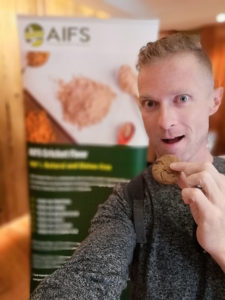
The guys at AIFS have created cricket powder which is nearly tasteless and odorless, providing all of the nutrition in a neutral powder that functions great with anything…like these delicious cookies. (Egg and dairy free, too…ie, Entovegan!)
But there are myriad reasons why Singapore is the world’s most competitive economy, and Dr Koh pointed out that these initiatives are meant to facilitate both academia and industry, not just one or the other.
Entities such as A*STAR research institute and others are exploring improved food safety techniques and creating modern go-to-market strategies to set new businesses up for a higher chance of success.
CORPORATES SUPPORTING SMALLHOLD FARMERS
Other keynotes I’d like to highlight were execs of Pepsi and IBM, who touched on similar subjects from different angles: big data, ai, analytics, supply chain, in-store insights, and consumer engagement.
Pepsi has a sustainable farming program in 38 countries with 40,000 farmers, giving them a massive market for their open innovation ventures project. They look at more than 10k companies around the world and this year have invested more than USD $50M, and in 2020, they are starting a tech development program.
One interesting point that was made which can apply to insects, was that “the more efficient our processing, the fewer constraints we have on our farming”. Applied, this could be an angle for insect companies to both stand apart in the market individually, while still working with collectives of smallhold farmers and making the most social impact possible as well.
For IBM, their approach to data and the supply chain is of course with hyperledger and their Food Trust blockchain supply chain transparency and provenance initiative. As many have heard me saying repeatedly the past year, it’s imperative that the insect industry proves its worth in relation to Sustainable Development Goals, which means data transparency and traceability (provenance).
They have had success with other industries the past 18 months, and I would fully expect that they’ll be doing something with insects (and one or more of the largest insect companies) in the coming year. It’s an initiative I fully support, because that’s the exact solution the industry needs as a foundation to build on, for food and for feed.
Quite a few of the other panels and startup pitches throughout the day touched on these topics (for general agriculture in Asia, not insects), especially with regard to solutions for smallhold farmers.
I’ve talked many times about the importance of smallhold farmers – especially in the insects as food sector – so I won’t reiterate that here, but similar to the takeaways from the Economist Feed the Future event in August, the solutions and strategies can be directly applied to our industry.
FROM HOMEMADE NETS TO DRONE TECHNOLOGY
There was also a lot of discussion related to the timeline. With Singapore confidently stating they plan to have 30% self-sufficiency by 2030, changes were being discussed in terms of today’s tech solutions being rolled out in the coming year to 3 years, not decades from now as many of the 2050 SDG theorizing has been.
Most panelists and speakers believed that a leap forward in agtech adoption would happen with smallhold farmers across Asia, but there was some skepticism to a very short timeline, and more agreement that it would take place over the course of the decade.
However, my takeaway from that hesitation to believe it could happen so quickly, is that they were basing it on the fact that most agricultural crops have only 2-3 cycles per year. Thus, there’s higher risk for the farmers to use unproven technology or systems, and the timeline for proving efficacy of solutions is longer as well.
With insect agriculture, that longer timeline and higher risk does not apply – insect ag in Asia revolves around crickets and BSFL, which have cycles measured in weeks, and where segregation of test groups at smaller size is feasible and presents a viable option for proving new technologies.
There is plenty of opportunity in my opinion for unique technological solutions applied to insect farming, to be demonstrated as improving efficiency, yield, and profitability, and for more rapid adoption.
INVESTORS STILL LEARNING THE AGRI-FOOD SECTOR
There was also plenty of other discussion related to the overall agricultural and agtech investment climate. It was decidedly more positive and optimistic than I’ve seen the past few years, where there has previously been interest but healthy skepticism.
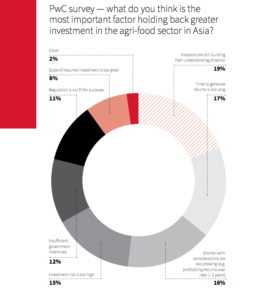
19% of investors said they’re still learning the sector, while 17% said the time to generate returns is too long.
I think in part because of the extraordinarily high-multiple returns some VC’s earned in Beyond Meat’s IPO, alternative protein is no longer viewed suspiciously, it has fully arrived. And judging by the positive mentions of insect-based solutions throughout the event, and the large number of insect-related companies in attendance and presenting, I’d say that bodes very well for the sector.
Well, with a caveat – the insect industry has to prove it is truly sustainable, through data. 🙂 But I think that’ll begin to happen in a big way in 2020.
In reading through a report from Temasek (one of the event’s sponsors) sent out following the Agrifood Innovation week, there was an interesting graphic which showed the reasons holding back more investment into the agri-food sector in Asia, and a full 36% related to a combination of a lack of investor understanding of the space (19%) and time to generate returns being too long (17%).
I believe that’ll look significantly different one year from now, for general agri-food in Asia and as pertains specifically to insects (which would probably have significantly higher %’s for both of those right now – but declining).
GENETIC ENGINEERING & GMO’S
Finally, one panel that I’m still pondering and doing more reading about related to the difference between GE and GMO’s, and the extraordinary benefits agriculture has seen from Genetic Engineering, contrasted with the broad lack of understanding in the differences between the two, and the real health benefits vs dangers.
It was a panel loaded with 4 individuals who are likely at the top of the GE world, so they were heavily in favor of genetic engineering as a solution for hardier, more resilient crops (eg “submarine rice” which can be submerged for weeks without damage) as a means to improve smallhold farm productivity even in the face of unpredictably changing climate shifts.
I thought it was interesting from an insect vertical perspective, because over the past few years through extensive R&D many of the world’s leading insect producers have been able to achieve vastly shorter lifecycles and greatly improved nutritional makeup of the larvae and/or adults, along with more efficient breeding techniques.
The opinions they expressed related to educating the populace of the upside to these processes, which in many ways are simply speeding up the evolutionary natural selection, I think will be important to have an understanding of and encapsulate in clear messaging for consumers as our sector grows.
Overall, day 1 of the Agrifood Innovation conference was akin to drinking from a firehose with the amount of information disseminated and with the myriad conversations I had individually.
While the focus was quite broad on agriculture and food production in Asia, the inclusion of insects as food and feed, and the potential for incorporating the general agtech options into the insect space, has given me plenty to ponder and a great deal of optimism for the next year of pushing forward with insects as a sustainable, nutritious solution!
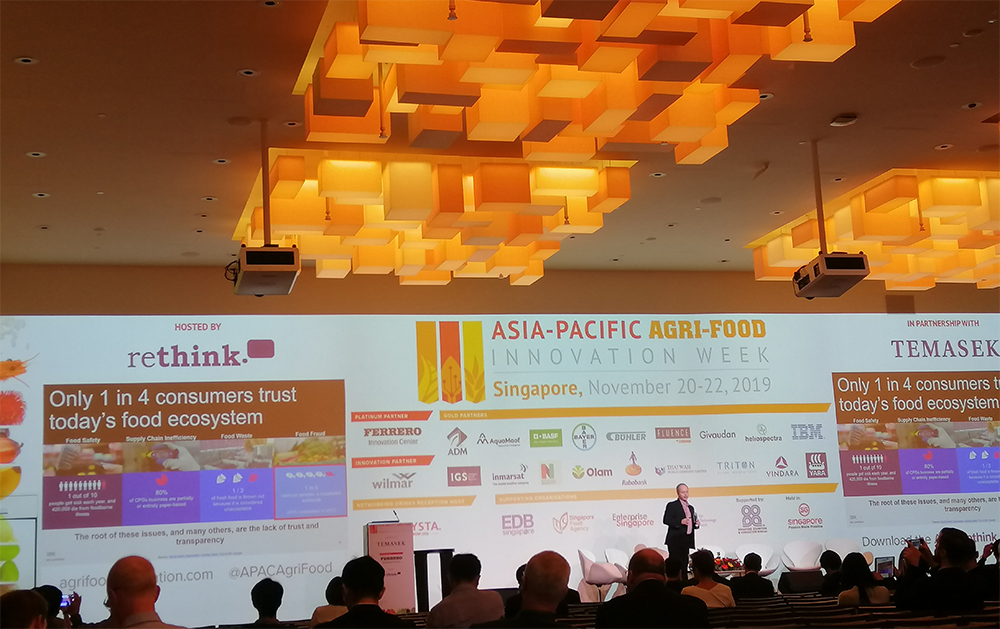
Will the insects as food and feed sector adopt blockchain traceability for the supply chain in 2020? Initiatives like Entovegan Certified are already seeking to develop this on the farm and producer side.

